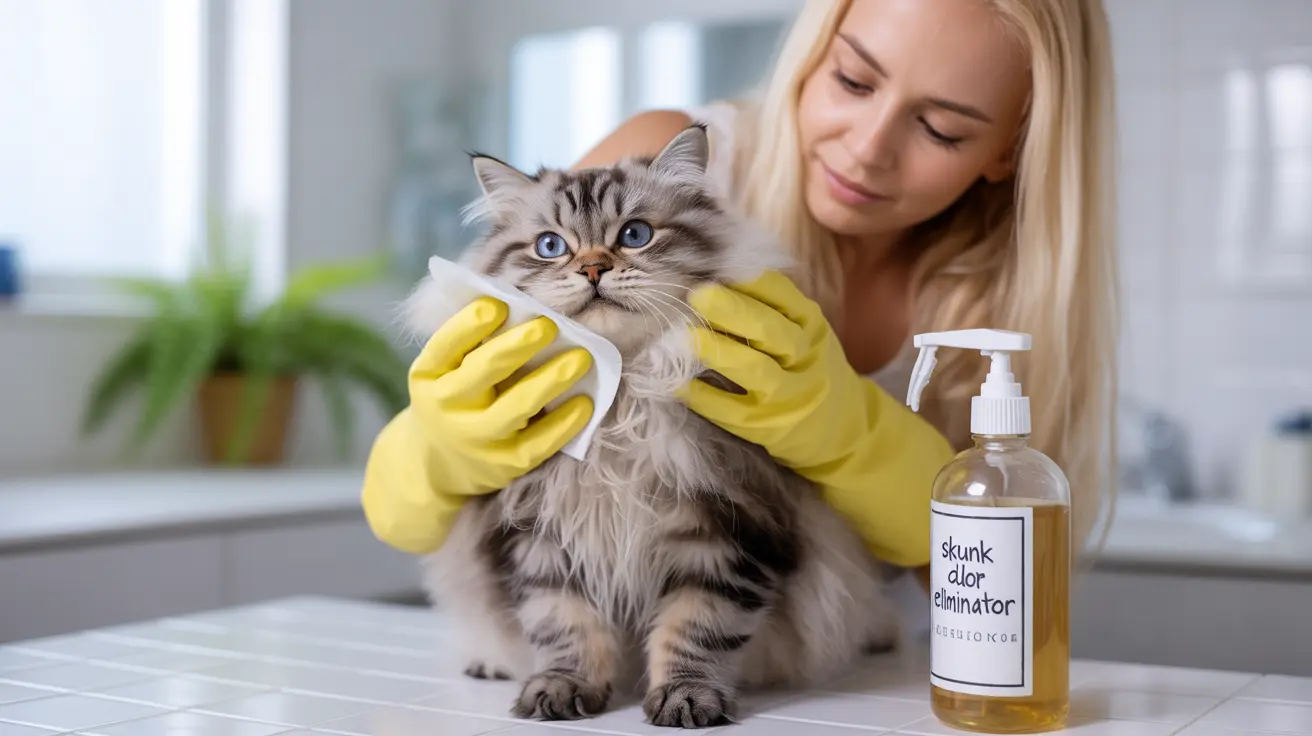When your cat gets sprayed by a skunk, quick action is essential to address both the overwhelming odor and potential health risks. This comprehensive guide will walk you through the exact steps to take, from immediate first aid to effective odor removal techniques, ensuring your feline friend's safety and comfort.
Understanding how to handle a skunk spray incident properly can make the difference between a minor inconvenience and a serious health concern for your cat. Let's explore the most effective methods for dealing with this smelly situation.
Immediate Actions After Your Cat Is Sprayed
The first moments after a skunk encounter are crucial. If your cat has been sprayed, follow these immediate steps:
- Keep your cat outdoors or in a well-ventilated area
- Check their eyes, nose, and mouth for irritation
- Put on protective gloves before handling your cat
- Contain them in one area to prevent spreading the odor
Assessing Your Cat's Condition
Before beginning any cleaning process, carefully examine your cat for these signs of distress:
- Excessive drooling or vomiting
- Difficulty breathing
- Red or irritated eyes
- Unusual lethargy or weakness
- Signs of direct contact with the skunk
The Most Effective Cleaning Solution
The most proven method for removing skunk odor involves a specific mixture of common household items:
- 1 quart of 3% hydrogen peroxide
- 1/4 cup baking soda
- 1 teaspoon liquid dish soap
Mix these ingredients fresh before each use, as the solution cannot be stored. Apply carefully to your cat's fur, avoiding their eyes and mouth.
Safe Application Techniques
When applying the cleaning solution:
- Wear protective gloves
- Work in a well-ventilated area
- Apply the mixture thoroughly to affected areas
- Leave on for 5 minutes
- Rinse completely with warm water
- Repeat if necessary
Aftercare and Monitoring
After the initial cleaning:
- Dry your cat thoroughly with clean towels
- Monitor for any adverse reactions
- Keep them indoors for observation
- Watch for signs of illness or distress
- Schedule a vet check-up if concerned
Prevention Strategies
To prevent future skunk encounters:
- Keep cats indoors during dawn and dusk
- Secure outdoor garbage containers
- Remove potential food sources from your yard
- Consider installing motion-activated lights
- Create barriers around common skunk habitats
Frequently Asked Questions
What immediate steps should I take if my cat has been sprayed by a skunk?
Keep your cat contained, check for eye or mouth irritation, and prepare a cleaning solution of hydrogen peroxide, baking soda, and dish soap. Avoid using water alone, as it can make the odor worse.
How do I safely remove skunk odor from my cat's fur without harming them?
Apply the recommended cleaning solution carefully, avoiding eyes and mouth. Work the solution into the fur thoroughly, let it sit for 5 minutes, then rinse completely. Repeat if necessary.
Can skunk spray cause health problems for my cat, and when should I see a vet?
Yes, skunk spray can cause eye irritation, respiratory issues, and in rare cases, anemia. See a vet immediately if your cat shows signs of difficulty breathing, excessive drooling, vomiting, or unusual lethargy.
Are commercial skunk odor removers safe and effective for cats?
Many commercial products are safe when used as directed, but always choose products specifically formulated for cats. Never use products meant for dogs, as they may contain harmful ingredients.
How can I prevent my cat from being sprayed by skunks in the future?
Keep cats indoors, especially during dawn and dusk when skunks are most active. Secure outdoor areas, remove potential food sources, and consider installing motion-activated lights around your property.
Remember, while getting sprayed by a skunk is distressing for both you and your cat, staying calm and following these steps will help resolve the situation effectively. If you're ever in doubt about your cat's health after a skunk encounter, don't hesitate to contact your veterinarian.






